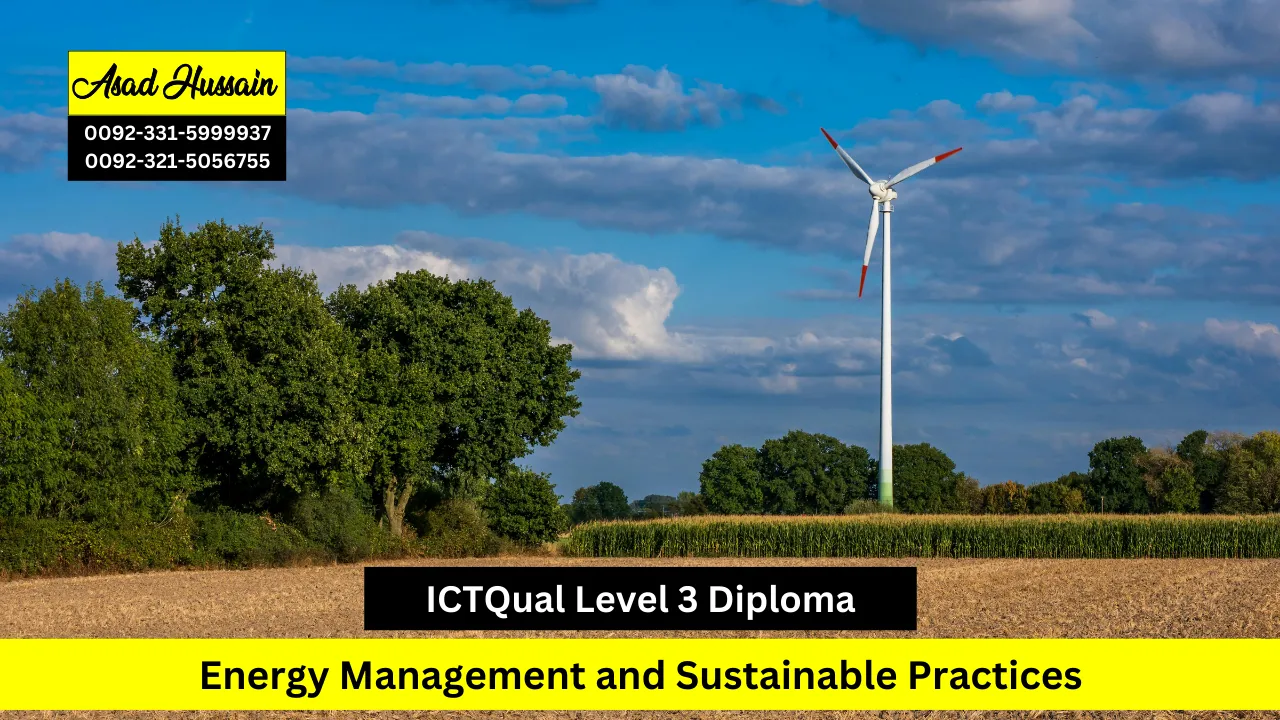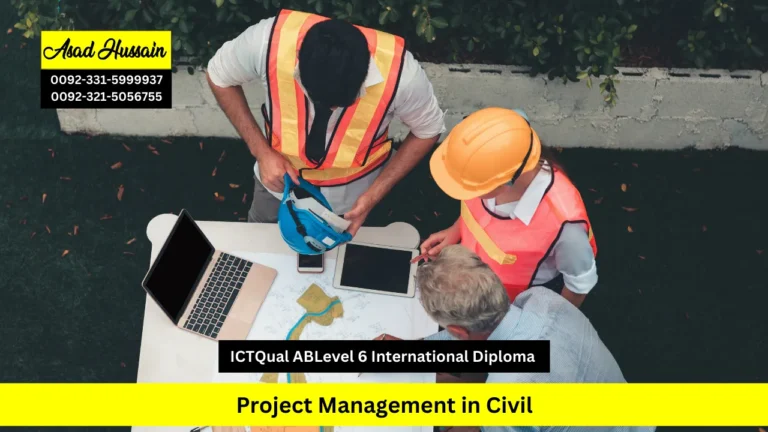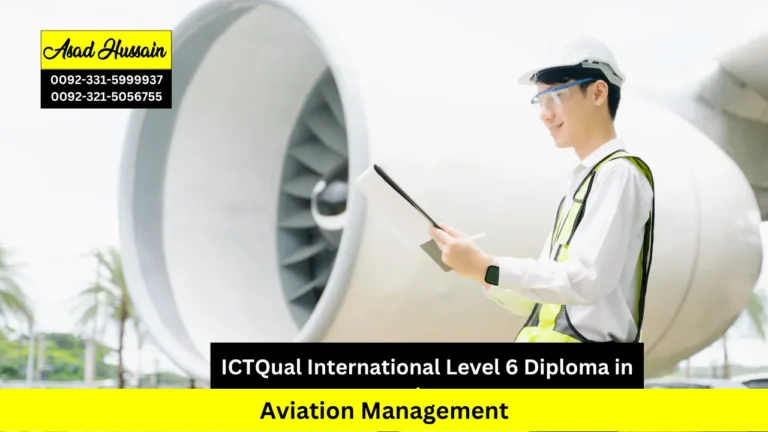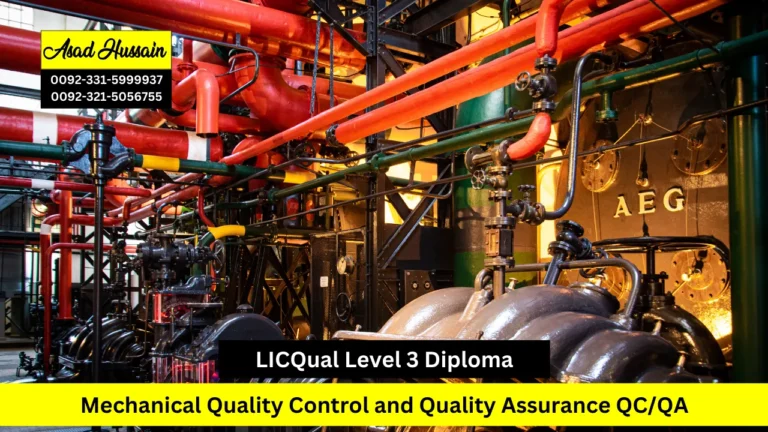In today’s rapidly evolving global economy, energy efficiency and sustainable practices are essential for businesses, communities, and governments striving to reduce environmental impact and optimize resources. The ICTQual Level 3 Diploma in Energy Management and Sustainable Practices provides learners with a foundational understanding of energy management principles, sustainability strategies, and renewable solutions. This program is designed to prepare professionals, students, and career changers to effectively contribute to energy efficiency initiatives and environmentally responsible practices.
The ICTQual Level 3 Diploma in Energy Management and Sustainable Practices covers essential topics such as energy auditing, sustainable energy systems, carbon footprint reduction, regulatory compliance, and best practices in energy management. Learners will gain practical skills to assess energy consumption, identify areas for improvement, and implement strategies that promote sustainability. By integrating theoretical knowledge with real-world applications, participants will develop problem-solving abilities, analytical skills, and the capacity to make informed decisions in energy management contexts.
Through practical workshops, case studies, and interactive learning activities, graduates will acquire the expertise to evaluate energy performance, recommend efficiency measures, and support organizations in meeting environmental goals. The program also emphasizes understanding local and international energy regulations, enabling learners to ensure compliance while promoting cost-effective and sustainable energy practices.
Graduates of ICTQual Level 3 Diploma in Energy Management and Sustainable Practices will be well-positioned to pursue roles such as Energy Management Assistant, Sustainability Coordinator, Environmental Technician, or Facilities Support Officer, gaining a competitive edge in industries that prioritize sustainability and energy efficiency. With its strong focus on applied knowledge and industry relevance, the ICTQual Level 3 Diploma in Energy Management and Sustainable Practices equips learners with the foundation needed to advance in energy management and drive positive environmental impact.
Program Highlights
Study Units
- Fundamentals of Energy Systems and Sustainability
- Energy Efficiency Optimization
- Energy Auditing Skills
- Renewable Energy Integration
- Energy Management in Specific Industries
- Sustainable Practices and Technologies
- Energy Policy and Regulations
- Energy Data Analysis and Reporting
- Emerging Technologies in Energy Management
- Project-Based Learning and Industry Collaboration
- Soft Skills for Energy Professionals
- Global Case Studies and Best Practices
- Capstone Project
The ICTQual Level 3 Diploma in Energy Management and Sustainable Practices is designed to provide learners with foundational knowledge, practical skills, and professional competence in energy management and sustainability. Graduates will develop the ability to analyze energy consumption, implement efficiency strategies, and contribute to sustainable practices across various industries. The program combines theoretical learning, practical exercises, and project-based applications to prepare learners for real-world challenges in energy and sustainability management.
Age Requirements
- Applicants must be at least 16 years old to enroll in the program.
- Mature learners aged 18 and above with relevant interest in energy management or sustainability are encouraged to apply.
Educational Requirements
- Completion of secondary education or equivalent (high school diploma, GCSEs, or relevant technical qualifications).
- Candidates with basic knowledge in science, engineering, or environmental studies are preferred.
Professional Experience
- No formal work experience is required; however, learners with exposure to energy, facilities, or sustainability projects will benefit.
- Individuals currently employed in support roles related to energy, operations, or environmental initiatives may find the course advantageous.
English Language Proficiency
- Non-native English speakers must demonstrate proficiency in English through IELTS (minimum 4.5) or equivalent qualifications.
- Evidence of prior education or work experience in English-medium environments may also be accepted.
The ICTQual Level 3 Diploma in Energy Management and Sustainable Practices is designed to provide learners with foundational knowledge, practical skills, and professional competence in energy management and sustainability. Graduates will develop the ability to analyze energy consumption, implement efficiency strategies, and contribute to sustainable practices across various industries.
Fundamentals of Energy Systems and Sustainability
- Understand the basic principles of energy systems, including electrical, mechanical, and thermal energy.
- Gain knowledge of sustainability concepts and the environmental impact of energy consumption.
- Identify the key components and operations of energy systems in various contexts.
Energy Efficiency Optimization
- Learn techniques to optimize energy usage in buildings, industrial, and commercial operations.
- Develop strategies to reduce energy waste and improve operational efficiency.
- Apply efficiency measures that balance cost, performance, and sustainability goals.
Energy Auditing Skills
- Conduct basic energy audits and inspections to assess energy consumption patterns.
- Identify areas for improvement and recommend actionable efficiency measures.
- Understand audit documentation, reporting, and compliance requirements.
Renewable Energy Integration
- Explore different types of renewable energy technologies, including solar, wind, and biomass.
- Evaluate opportunities for integrating renewable energy into existing energy systems.
- Understand the environmental and economic benefits of renewable energy adoption.
Energy Management in Specific Industries
- Examine energy management practices in sectors such as manufacturing, construction, and commercial operations.
- Identify industry-specific energy challenges and implement targeted solutions.
- Develop operational strategies to enhance energy performance across different sectors.
Sustainable Practices and Technologies
- Apply sustainable technologies and practices to reduce environmental impact.
- Learn about energy-efficient appliances, systems, and building designs.
- Promote sustainability in everyday operational and organizational activities.
Energy Policy and Regulations
- Understand local, national, and international energy regulations and standards.
- Apply knowledge of energy policy to ensure compliance in energy management projects.
- Evaluate the impact of regulatory frameworks on sustainability initiatives.
Energy Data Analysis and Reporting
- Collect, analyze, and interpret energy consumption data using standard tools.
- Prepare professional reports that highlight efficiency findings and recommendations.
- Use data to inform decision-making and energy optimization strategies.
Emerging Technologies in Energy Management
- Explore innovations such as smart meters, IoT systems, and energy management software.
- Assess the applicability of emerging technologies in improving energy performance.
- Understand trends shaping the future of energy management and sustainability.
Project-Based Learning and Industry Collaboration
- Participate in real-world projects that apply theoretical knowledge to practical scenarios.
- Collaborate with industry stakeholders to solve energy management challenges.
- Develop teamwork, planning, and project execution skills.
Soft Skills for Energy Professionals
- Improve communication, problem-solving, and analytical skills relevant to energy management.
- Develop leadership and decision-making abilities in operational and sustainability contexts.
- Learn to effectively present findings and recommendations to stakeholders.
Global Case Studies and Best Practices
- Analyze successful energy management and sustainability initiatives worldwide.
- Learn to adapt international best practices to local and organizational contexts.
- Gain insights into innovative approaches to energy efficiency and renewable integration.
Capstone Project
- Design and implement a comprehensive project addressing real-world energy management challenges.
- Integrate theoretical knowledge, technical skills, and sustainability principles in a professional report.
- Demonstrate problem-solving, analytical, and project management abilities.
Conclusion
Upon completing the ICTQual Level 3 Diploma in Energy Management and Sustainable Practices, learners will possess a well-rounded combination of technical knowledge, practical skills, and professional insight. Graduates will be prepared to pursue roles such as Energy Management Assistant, Sustainability Coordinator, Environmental Technician, or Facilities Support Officer, equipped to implement energy efficiency initiatives, promote sustainable practices, and contribute meaningfully to organizational and environmental goals.
The ICTQual Level 3 Diploma in Energy Management and Sustainable Practices is designed for learners seeking foundational knowledge and practical skills in energy management, sustainability, and renewable practices. This program is ideal for individuals who want to contribute to energy efficiency initiatives, promote sustainable practices, and enhance their career prospects in energy and environmental sectors.
Educational Instructors and Trainers
- Professionals teaching energy, sustainability, or environmental science courses who wish to update their curriculum with practical energy management skills.
- Trainers looking to incorporate hands-on activities and simulations into their teaching programs.
Environmental Advocates and Activists
- Individuals involved in sustainability campaigns, environmental projects, or community energy initiatives.
- Advocates seeking technical knowledge to support energy efficiency and carbon reduction projects.
Corporate Social Responsibility (CSR) Professionals
- CSR managers and sustainability officers looking to integrate energy efficiency into organizational initiatives.
- Professionals responsible for monitoring energy usage and reporting sustainability performance.
Students and Recent Graduates
- Learners with backgrounds in science, engineering, or environmental studies seeking foundational energy management skills.
- Graduates aiming to enhance employability and gain practical expertise in sustainability and energy practices.
Career Changers
- Professionals from other sectors wishing to transition into energy, sustainability, or environmental roles.
- Individuals seeking recognized qualifications to support career progression in energy management.
Policy Makers and Regulators
- Government officials and regulators involved in energy, environmental, or sustainability policy.
- Professionals responsible for enforcing energy regulations and compliance standards.
Conclusion
This program is ideal for learners committed to building a foundation in energy management and sustainable practices. Graduates will gain the knowledge, practical skills, and professional insight required to contribute effectively to energy efficiency initiatives, support sustainability goals, and pursue further career advancement in the energy and environmental sectors.







